Of all the great shipping magnates perhaps none has achieved more lasting fame as Aristotle Onassis. Certainly no one involved in the industry made the transition into popular cultural icon more effectively than the man also known as Aristo and Ari, a man whose life played out like a classic Greek tragedy, filled with controversy and glamour. He remains an intriguing and paradoxical figure the fleeing refugee turned flamboyant billionaire, the family man with a playboy lifestyle. Undoubtedly possessing great personal charm and charisma he could also be verbally and physically abusive, ruthless and cruel. That he clearly lived by his mantra ‘Business before family’ seems indisputable, yet he was so distraught at the death of his 24 year-old son Alexander that it undoubtedly contributed to his own subsequent illness and demise two years later. Like him or loathe him there can be no denying the exceptional nature of the man and his achievements.
Such is the enigmatic nature of Aristotle Socrates Onassis’ that even his birthday and year is the subject of conjecture. In terms of date, 15th, 19th and 20th January are quoted and birth years range from 1900 to 1906. Onassis, it appears, was prone to changing his age in order to suite the circumstances. Irrespective of when, it is generally agreed that he was born in Karatas, a suburb of the port city of Smyrna (modern day Izmir), to Socrates Onassis, a Turkish citizen of Greek ethnicity who was a successful local tobacco trader, and Penelope Dologou. He had one sister, Artemis, and two half-sisters, Kalliroi and Merope, by his father’s second marriage.
Ari enjoyed a privileged childhood and education, attending the local private Evangelical Greek School where he was a clever but troublesome pupil. When he graduated he spoke four languages, his native Greek, Turkish, Spanish, and English and had an excellent grasp of figures. He appears to have acquired his father’s business acumen from a young age. Although ethnic Greeks made up approximately half the population (exceeding the population of Athens at this time) Smyrna was a cosmopolitan city with a large Turkish community and also sizable Armenian, Jewish and Levantine sectors. In May 1919 the city was forcibly taken by the Greeks with the encouragement of the victorious Western allies, as part of the dismantling of the defeated Ottoman authorities. This action sparked the three year Greco-Turkish War in which initial Greek territorial gains were steadily rolled back until, in September 1922, Turkish National Movement forces stood at the gates of Smyrna. To begin with the takeover of the city was carried out in an orderly fashion but within days this descended into chaos with Turkish units rampaging through the Greek and Armenian sectors of the city, looting, murdering and raping seemingly at will. On 13th September 1922 the Greek and Armenian districts were torched, creating the Great Fire of Smyrna which raged for nine days. The fire forced tens, perhaps hundreds of thousands of displaced people to take refuge on the Mediterranean shoreline, Socrates Onassis was imprisoned and sentenced to death.

It is here that the lines between myth and fact become blurred. The Onassis family had lost everything but Aristotle managed to escape via Constantinople to Athens, according to those who set his birth year as 1900, including the FBI, this was by lying that he was only 16 and therefore a child, when he was actually 22 years old. Supposedly living on his wits he subsequently moved to Naples before booking passage onwards to South America. Ari arrived in Buenos Aires under the Nansen passport scheme which was introduced by the remarkable Norwegian under the auspices of the League of Nations, by which those of indeterminate nationality could travel. The self-publicist within would always peddle the lonely pauper story but in fact he was joined in Argentina by his first cousins Nikolaos and Constantinos Konialidis. He studied commerce and port-duty administration by day and secured employment as a night-time telephone operator with the British United River Plate Telephone Company. Listening in to international calls Onassis further improved his language skills and, in tandem with his studies and in conjunction with his cousins, began formulating ideas for a new business venture. They decided to move into tobacco, the industry his father had been involved in, importing Turkish leaf and cigarettes and subsequently developing their own products aimed at the untapped ‘female smokers’ market, pink coloured filters, no less!
His entrepreneurial skills quickly brought him fortune and status although there were also allegations of smuggling activity. Wealth and power would remain the key drivers throughout the rest of his life, informing every move he made in both his business and personal life. Image was as important as substance to Onassis and he worked hard to cultivate and portray a successful, affluent persona. By the age of twenty five he is reputed to have earned his first million dollars. In 1929 he became an Argentine citizen but retained his Greek heritage and took the position of Vice Consul of Greece to Argentina in 1931.
It was around this time that Aristotle Onassis became interested in shipping. Unlike most of the Greek ship-owning fraternity he had no historical connection to the maritime world and regarded it as just another money making commodity. As with Turkish tobacco his skill in identifying niche opportunities for profit and securing the means for exploiting them to the full soon manifested itself. These were the depths of the Depression and he made his first tentative steps by acquiring six laid-up First World War vintage freighters from the Canadian National Steamship Company at a bargain price, through a Greek intermediary based in London. Pressed into action he named the first three Onassis-Kalliroi, Onassis-Penelope and Onassis-Socrates after his half-sister and parents. In Argentina at this time he also encountered a growing number of Norwegians who were pioneering the transport of the most prominent commodity of the century, oil, in specially constructed tankers. On passage to Europe in 1934 Onassis met Ingeborg Dedichen whose father happened to be a Norwegian shipowner. In the course of a decade long affair Ari was introduced to a broad range of Scandinavian owners, builders and operators. Not for the first or last time a woman would prove instrumental in forging business relationships. In 1938, against a litany of specialist advice he commissioned not one but three of the largest oil tankers to date and his first new build vessels. At 10,000 grt the Swedish built Ariston and her subsequent sisters Aristophanes and Buenos Aires had a central bridge and accommodation block configuration, with the funnel and machinery located aft. To circumvent a law preventing the export of merchandise, including ships, the Ariston and the unfinished Aristophanes were nominally transferred to the Norwegian Anders Jahre (introduced by Dedichen) for the duration of the war, but ultimately returned to one of Onassis’ Honduran companies and would serve the company until the late 1960s and early 1970s.
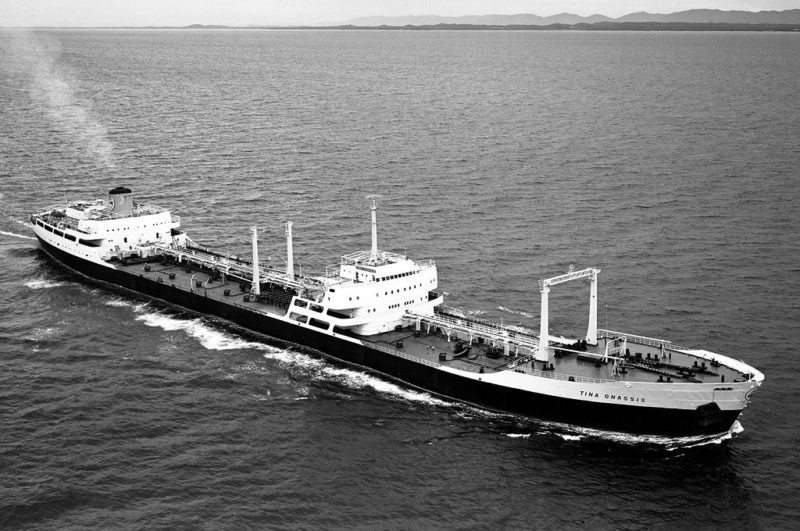
Despite charging some of the lowest freight rates on the market Onassis’s immediate success and high profitability was primarily founded on very low running costs. Controversially all his vessels were owned by companies located in Panama, Liberia, Uruguay and Honduras and registered under flags of convenience, mainly Panama and Liberia, thereby minimising tax and regulatory commitments. He also adopted a business structure under which owner and operating companies were separated. Such arrangements are the norm today but at the time they were quite revolutionary and allowed Onassis to undercut the UK and US flag competition. He had amassed a fortune by the late 1930s and travelled extensively. In 1940 Onassis moved to New York from where he managed his burgeoning business empire, impressing himself on the US military and political establishment. He also spent time in Hollywood, where his playboy antics drew the kind of attention and publicity he relished. He had an affair with Gloria Swanson and was linked with Greta Garbo.
Despite his rising prominence Onassis was sidelined by the biggest players in Greek shipping circles when it came to post war negotiations regarding the allocation of superannuated Liberty ships. Not for the last time Aristotle Onassis employed his seductive ability with women as both a weapon of vengeance and a means to heightening his public and professional image. He set his sights on Athina (Tina), the beautiful daughter of Stavros G. Livanos who was the most prominent of the long established Greek shipping magnates. Livanos had benefitted most from the Liberty ship dispersal, obtaining twelve of the one hundred allocated to Greece at considerably reduced rates. Onassis received none.
Regardless of the considerable age gap (Tina was just seventeen years old at the time) Livanos gave the couple his blessing and they were married in 1947. In marrying Tina he was to ingratiate himself on the higher circles of Greek shipping and it also served as a rebuke to fellow shipping arch rival, Stavros Niarchos. Niarchos also courted her but subsequently married Livanos’ older daughter Eugenie. As a postscript it is interesting to note that, at least at this stage, Livanos had little respect for either of his newly acquired sons-in-laws. He was a naturally cautious man whose wealth had been amassed from shrewd investment and the principal of never borrowing or overstretching his financial resources. He was notoriously penny-pinching. He allegedly deplored the young men’s flamboyant lifestyles and high risk philosophy. Onassis and Niarchos would remain rivals for the rest of their lives, constantly vying to outdo each other with an almost childlike vehemence.
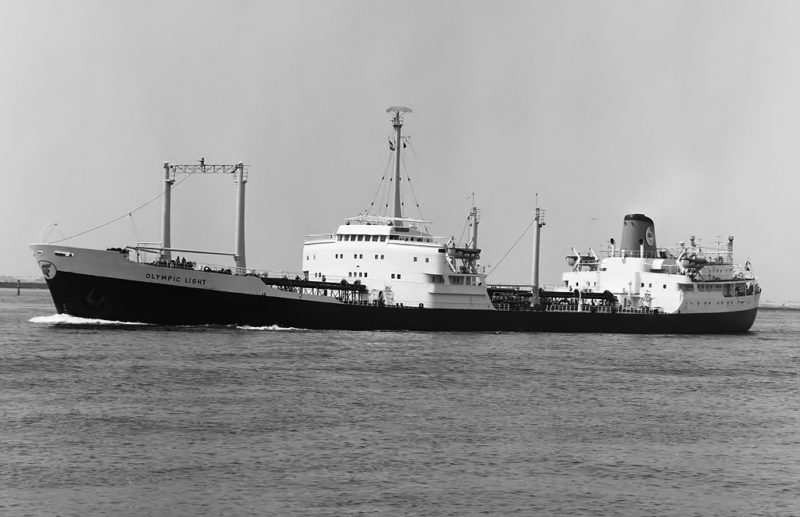
In the immediate post-war era one of Onassis biggest success’ was securing long-term fixed price contracts with some of the major international oil companies, such as Mobil and Texaco. Having been sidelined by the Greek shipping establishment in respect of both the country’s allocation of Liberty ships and T2 tankers he decided to act independently. In 1947 he applied to purchase eighteen surplus wartime ships but was rejected by the US Maritime Commission. After seeking legal advice from a prominent New York attorney he established American companies with US citizens as ‘sleeping’ directors, and through a subsequent application acquired twenty four of the laid up vessels, including over a dozen T2 tankers. Financing this project proved another of Onassis’ masterstrokes, achieved through a combination of loans, bonds and guarantees issued by American banks. In addition to the second hand tonnage Onassis also achieved economies of scale by ordering six new supertankers from the Bethlehem Shipbuilding Corporation’s Sparrow Point yard in Maryland, which were delivered between 1948 and 1950.
The complexity of the ownership and operating structure allowed Onassis to retain overall control but avoid being linked too closely to the day to day activities of his growing burgeoning fleet. The US authorities at this time were engaged in a contradictory policy, isolationist by nature they had unsuccessfully tried to expand the nation’s own merchant fleet to meet the huge demand for tramp and tanker requirements. They therefore actively (but clandestinely to avoid repercussions with their own powerful maritime unions) encouraged the Greek shipping powerhouses based in New York to ‘flag-out’ their fleets, first to Panama and then Liberia. The Greeks were truly internationalist by nature and unfazed by the moral scruples, or hypocrisy depending on one’s viewpoint, afflicting other nationalities. Therefore when the Korean War erupted in 1950 and freight rates in the region escalated the Greek shipping magnates readily carried cargo for both the Chinese and North Koreans and the US and United Nations protagonists.
Outraged by the thought that goods supporting the ‘Reds’ war effort were being transported on America’s surplus wartime fleet, which had been sold at such preferential rates, the US administration decided to investigate the Greek magnates, of which Onassis was now the most prominent. Despite Greek troops forming part of the UN’s ‘policing’ operation in Korea the shipowners were not acting illegally as the ban applied only to US flag operators. Nevertheless in a very public attempt to discredit the man and his business, Onassis, along with others including Livanos and Niarchos was charged with fraud. He was found guilty of violating the nation’s shipping laws which stipulated that only US citizens could own and operate US registered and flagged vessels. He had breached the rules but not for the last time Onassis had become embroiled in the machinations of American politics, the Republican majority in congress were seeking to expose what they perceived to be policy failures and corruption in the Democrat led Truman administration. On 24th March 1954 the first of seventeen ships, the T-2 tanker Lake George was seized by the Ministry of Justice. Subsequently Onassis pleaded guilty to the charges and paid a $7 million fine.
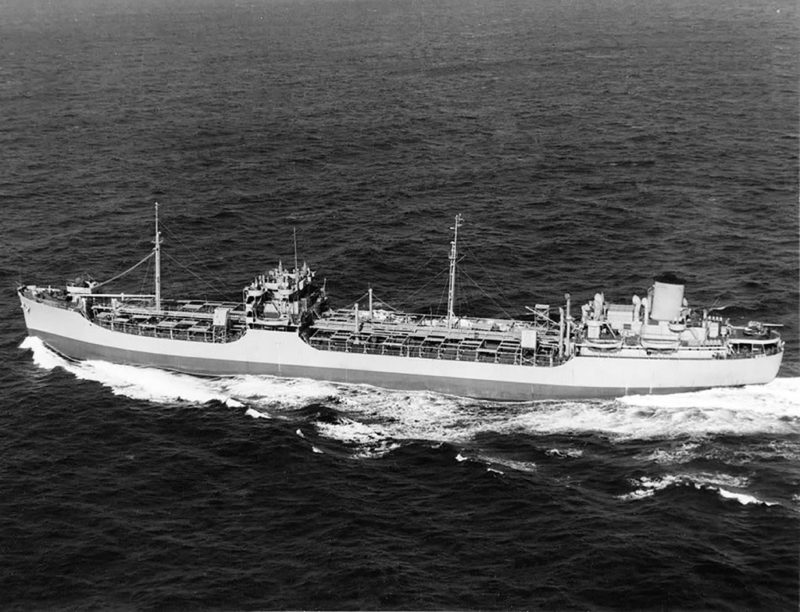
Having invested so much time, energy and money in his American ventures Aristotle Onassis undoubtedly felt aggrieved at his treatment by the US authorities. Even as the FBI scoured his company accounts and files he decided to shift his business focus to Europe. Turning his back on the American shipbuilders he now entered into negotiations with several West German yards which were seeking to reestablish themselves on the international stage after the war. In 1953 he commissioned the 49,722 dwt Tina Onassis, the largest tanker in the world and considered by many to be the world’s first supertanker from the Howaldtswerke (HDW) yard in Hamburg. Even more remarkably Tina Onassis represented just one of eighteen large tankers to be delivered from three West German shipyards between 1953 and 1955. Once again he had obtained an excellent price by commissioning the ships en bloc.
As the tanker Tina Onassis was emerging on the stocks in Hamburg, HDW’s other Kiel yard was simultaneously starting the conversion of a vessel that was destined to be her owner’s most famous acquisition. In 1951 Onassis purchased the former Canadian river class frigate HMCS Stormont for $34,000. She had seen action on the Atlantic and Arctic convoys and been present at the Normandy landings in June 1944 but was decommissioned in November 1945 and sold to private interests in 1947. Onassis lavished $4 million on rebuilding the 325ft naval veteran, which emerged as the most luxurious private yacht in the world, although arch rival Niarchos would perhaps justifiably consider his three-masted Creole a worthy contender. Designed by Cäsar Pinnau the Christina was named after Ari’s daughter and featured nine suites in addition to Onassis’ own four bedroom suite of rooms. Air-conditioned throughout and including a signature grand spiral staircase, the outer decks included a heated swimming pool with inlaid mosaics that could be raised to create a dance floor at the touch of a button. Rather poignantly Onassis said of Christina ‘This is the only place in the world where I don’t feel a stranger’ and throughout the rest of his turbulent life it remained a refuge and his personal pride and joy. The Christina also became the focus of Aristotle’s social life, her suite’s housing an endless cycle of rich and famous guests. From Winston Churchill to Grace Kelly, Elizabeth Taylor and Richard Burton to John Paul Getty, Marilyn Monroe to Sophia Loren, Onassis’ entertaining on Christina became a thing of legend.
As well as shifting his business operations across the Atlantic Onassis also physically moved to Europe. In 1953 he took up residence in Monaco, securing a majority stake in the Société des bains de mer de Monaco (SBM), a company that owned the casino, Hôtel de Paris and almost a third of the Principality’s real estate. As much as the financial benefits of this move it gave Onassis the status and publicity that he craved. Prince Rainier III had initially welcomed the Greek billionaire’s involvement in reviving the Principality but he and Onassis subsequently fell out and remained at odds for over a decade regarding the direction Monaco should take. Ari wanted it to remain an exclusive tax haven for the super-rich whilst the Prince wanted to develop a more egalitarian tourist industry. Ultimately in June 1966 the Prince won the day in terms of securing control of SBM but the more enduring legacy is arguably that of Onassis. Monaco would remain the gilded European haven of the super-rich he had always envisaged.


The Monaco involvement was illustrative of Ari’s desire to be in the limelight but also his willingness to confront the establishment, a policy which would lead to a litany of legal actions and recriminations over the years. Arguably Onassis’ most audacious move came in January 1954, the year after he took control of SBM. Saudi Arabia had emerged as a leading oil producer in the 1930’s and granted concessions for the extraction and export of ‘Black gold’ to American companies from the start. In 1943 with the US in desperate need for increased oil supplies to feed the war effort and the Saudi Arabian economy struggling, an extended and exclusive agreement was signed between the kingdom and the Arabian American Oil Company (Aramco). In effect the Americans now had a monopoly over the market but whilst revenues grew rapidly in the postwar era and the King’s personal wealth amassed accordingly, the Royal family became disenchanted that corporate America was making more money out of Saudi oil than the kingdom itself.
In a move that sent shock waves through the industry and wrong footed both Aramco and the US Government, Onassis signed a deal with the Saudis for the exclusive rights to transport its oil in January 1954. Under the terms of the secretly negotiated agreement he formed the Saudi Arabian Maritime Company (SAMC) which would provide a minimum of 500,000grt tanker capacity and sail under the Saudi Arabian flag with Saudi crews. It was alleged that he had brokered the deal by offering financial ‘incentives’ to prominent Saudi politicians and businessmen. In purely shipping terms the daunting repercussion was that if every oil producing country followed the Saudi lead then the US tanker fleet would be rendered redundant, a major strategic as well as economic problem. Nevertheless the impact went deeper and wider, given both the financial and political implications it was clear that Ari would not only incur the wrath of Aramco and every independent tanker operator but that he had destabilised Americas ‘special position’ with Saudi Arabia. Onassis was already on the CIA’s radar over the Korean War shipments, but now his actions challenged and threatened the US government’s entire foreign policy strategy.
Perhaps inevitably there would be consequences. Officials were authorised by the National Security Council, including President Eisenhower, to ‘use all appropriate methods’ to bring about an end to the agreement, or in any case to make it ineffective. Initially they tried to persuade the Saudi government that the Onassis agreement was not in their best interests.
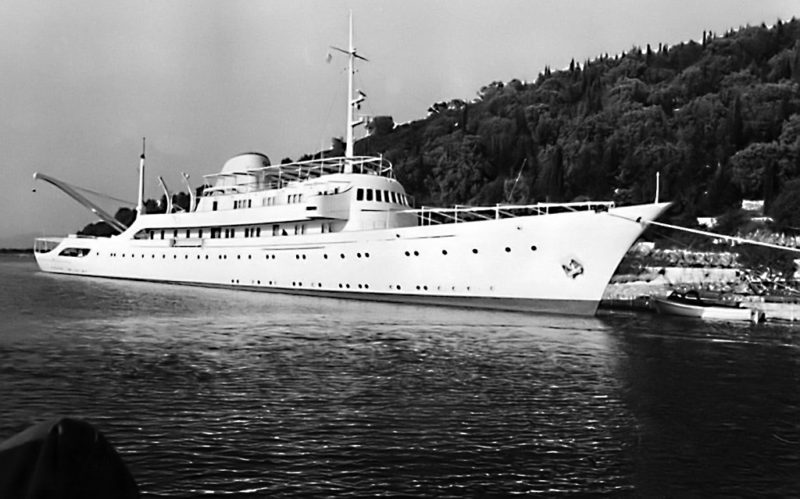
Onassis had probably underestimated the impact his Saudi venture would have. The political ramifications were backed up by concerns about the more widespread commercial implications on freight rates. With the tacit agreement of the US State Department, American oil companies boycotted the SAMC and subsequently a broad spectrum of customers refused to use Onassis’ ships. As more and more of his fleet were laid up the financial pressures mounted. Meanwhile Aramco and the Saudi government went to arbitration to resolve the dispute, the American company claiming that the 60 year agreement signed by its predecessor gave them exclusive rights to extract and transport the Kingdom’s oil.
With neither the American government, nor the Saudi’s wanting to lose face these formal discussions were a façade for a range of behind the scenes activity. Ultimately the whole issue was resolved almost by accident. The Suez crisis of 1956 closed the eponymous canal, requiring oil shipments from the Middle East to be transported via the African Cape. Tankers were now in high demand and the boycott of his vessels ironically worked in Onassis’ favour. He alone could meet the sudden demand for tanker tonnage and so lucrative was the new employment that the ‘Golden Greek’, as he was known in the USA, no longer needed the SAMC contract. When the Saudis, under pressure from the US administration, subsequently offered him a chance to walk away from the deal without penalties he readily accepted the offer.
Another profitable Onassis business venture in this period, starting in 1950, was whaling. Whilst the international bans and ‘save the whale’ campaigns were still some way off it was nevertheless an industry that raised eyebrows in many quarters, and not just ardent environmentalists. With typical ebullience Onassis converted one of the old T2 tankers into a factory ship, which was named Olympic Challenger, and reconfigured fifteen old corvettes as whalers for operations off South America’s Pacific coast, manned by experienced German and Norwegian crews. Incurring the displeasure of the Peruvian authorities and once again upsetting the establishment, especially the Norwegians, the whole operation courted further controversy when guests were allegedly invited onboard to witness the slaughter and even fire harpoons. In 1956 he sold the whaling business for $8.5 million to the Japanese Kyokuyo Hogei Kaisha Whaling Company, amidst allegations of malpractice aboard the Olympic Challenger. The exposé followed a Norwegian newspaper’s investigations into the widespread killing of immature animals.
The mid-1950s represented the apogee of Onassis’ shipping business under the umbrella of Olympic Maritime based in Monte Carlo. His web of companies owned more than sixty freighters and tankers as well as the sixteen whaling ships. Perhaps sated in this regard but also buoyed by the resolution of the Saudi controversy he now took to the skies. On 30th July 1956 Onassis acquired TAE, Greek National Airline which had been formed five years earlier as a state owned merger of three independent airlines. The TAE operation had been racked by strikes and cash shortages since its inception and closed down in 1955. It has been said that Olympic Airways, as the airline was renamed in April 1947, was Ari’s favourite business venture and that the tanker operations earned the profits that he then lavished on his airline. Certainly it was a source of immense pride for him, cabin crew were attired in Pierre Cardin designed uniforms and meals were eaten with gold-plated cutlery in First Class. It gave Onassis great satisfaction that he was one of only two men to own their own private airlines. The other was the legendary American Howard Hughes, who owned TWA.
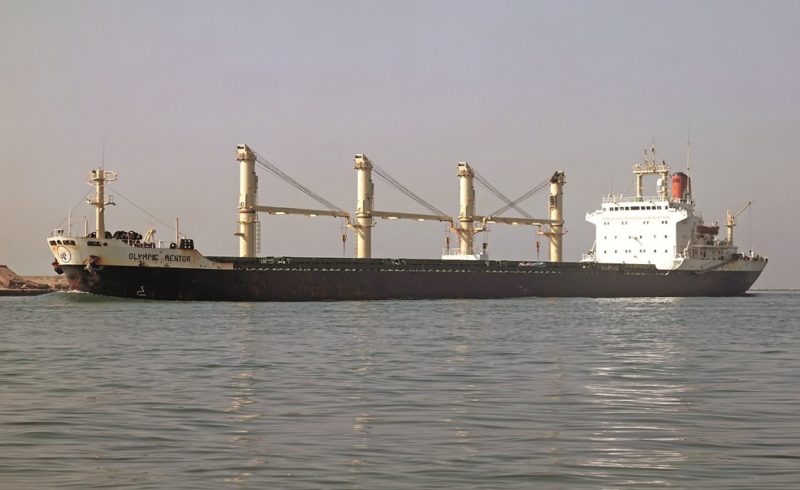
That he turned the airline around so quickly was testimony once again to both his vision and investment. An initial stumbling block was the company motif. After the International Olympic Committee (IOC) threatened legal action over the use of their five ringed symbol for the company livery, Onassis simply added an extra yellow one to the top row. The six ringed tail-fins were soon soaring across Hellenic skies. To allay fears amongst a skeptical populace short free flights were offered and in order to grasp a competitive edge Onassis placed an order for four de Havilland Comets in 1959, the airline’s first jet aircraft, which flew direct from Athens to London in less than three hours. Six years later Olympic Boeing 707s inaugurated a non-stop Athens to New York (JFK) service.
Just as Aristotle Onassis’s business dealings reached their lofty peak so his personal life entered a new and turbulent phase. In 1957 he met and started a very public affair with the opera diva Maria Callas. In truth his marriage to Tina was already a sham by that time and in 1960 they were divorced. Callas and her husband also divorced and she remained as Onassis’ mistress, lover and confidante until the end of his life. Perhaps as a result of the break-up of his marriage or simply because he wanted a bolt hole, in 1962 Onassis purchased the barren, virtually waterless 74 acre island of Skorpios in the Ionian Sea off the west coast of Greece. The initial purchase price was about 3.5million drachmas (roughly £10,000) but as with the yacht he then spent millions on infrastructure, houses and most conspicuously of all, trees.
Olympic Maritime continued to prosper throughout the 1960s but somehow the ‘Golden Greek’ seemed tarnished. Possibly there was an element of pride before a fall but his courting of and subsequent marriage to former US president JFK’s widow Jackie Kennedy in October 1968 was perhaps a final desperate bid for publicity or one-upmanship over Niarchos. Despite subsequent protestations he knew Jackie was primarily interested in spending his money and if he had hoped the wedding would achieve some form of détente with the US it backfired spectacularly. His children, Alexander and Christina, disliked the American so much (almost more than Callas) that they refused to be in the same house and although he had never been a particularly close or attentive father, he became more and more estranged from them. 1968 also saw him courting members of the military junta, particularly Prime Minister Georgios Papadopoulos on whom he showered gifts and hospitality regarding a major investment in national infrastructure. Code named Project Omega nothing ever came of these plans and when the junta was replaced they were dropped.

In the first year of the new decade Onassis’ life started to unravel. On the business front the chartered Liberian registered tanker SS Arrow ran aground at Chedabucto Bay, Nova Scotia. The ensuing leakage remains the most significant oil spill off Canada’s East Coast, almost a quarter of the amount that seeped from the notorious Exxon Valdez disaster in 1989. The subsequent inquiry established that the radar and echo sounder were inoperable, the officer of the watch had no licence and with the exception of the master none of the officers had navigation skills. Then in May 1970 Eugenie, his sister-in-law and arch rival Niarchos’ wife died in mysterious circumstances attributed to suicide. Two years later Niarchos married Tina which came as a devastating personal and reputational blow to Onassis. Ari always considered himself to have the upper hand in the personal rivalry between them but in marrying Onassis’ former wife, and the mother of his children, Niarchos not only usurped his adversary but perhaps exposed how superficial the marriage to Jackie had become. Still reeling from this personal blow on 22nd January 1973, Onassis received the news no parent ever wants to hear. His twenty four year old son Alexander had been instructing a novice pilot on his Piaggio amphibious aircraft when it crashed shortly after take-off at Athens’ Ellinikon Airport. The pilot and a fellow instructor were also seriously injured in the crash but despite his father summoning the finest neurosurgeons in the world Alexander died of his injuries the following day. Alexander was buried on Skorpios and Aristotle spent more and more time on the island, turning to drink with long ouzo-fuelled vigils at his son’s graveside. As a reaction to his son’s death he became disenchanted with the air industry of which he had previously been so fond and sold his shares back to the Greek government in 1974. He was also convinced that Alexander had been killed deliberately and offered a $1 million reward for information that could pinpoint the perpetrators. Regrettably the list of potential suspects was long, Onassis had many enemies and felt either the CIA or the Greek junta had been behind it. In the event investigators concluded that negligence was the cause, wires connecting the aircrafts ailerons had been attached incorrectly.
Together with alcoholism and increasing ill-health Onassis also had to contend with the fall-out of the Arab-Israeli war of October 1973. The immediate impact of OPEC’s ensuing embargo and cut in production (by December output was only 75% of September levels) was to reduce tanker revenues but the oil price rise and recession that followed also adversely affected Olympic Airways, which at the time he still owned, his various business projects and investments in places as diverse as Venezuela and Iran and his real estate businesses, including the 52 story Olympic Tower in Manhattan. In August 1974 his daughter Christina survived a suicide attempt but two months later her mother, Onassis’ first wife Tina, was found dead at her Paris mansion. Her death was officially recorded as relating to edema of the lung.
Over the winter of 1974/75 Onassis’ health continued to decline. He was diagnosed with myasthenia gravis, an incurable condition brought on by stress, alcoholism and fatigue. In February 1975 he travelled to Paris for treatment, Callas is said to have slipped in through a back door one evening for a final illicit rendezvous. On 15th March 1975 Aristotle Onassis died, his daughter by his side.
He was buried alongside Alexander on Skorpios. In his will Onassis had stipulated that 45% of his wealth should be used to form the Alexander S. Onassis Public Benefit Foundation. The arrangement consisted of a business foundation primarily involved in shipping and real estate whose assets and profits were to be used exclusively by a public benefit foundation, which continues to award grants and funds for a range of causes broadly defined as enhancing Greek culture and life. Christina inherited the remaining 55% of the family fortune, minus the $26 million settlement that was finally agreed with ‘Jackie O’, as the American media had dubbed Onassis’ second wife. Christina’s private life was as troubled as her father’s, she was married four times but died in 1988 at the age of 37 from a similar condition to that of her mother. Her daughter Athina, who was three at the time of her mother’s death inherited the fortune and legacy but also the burden that comes with it.
Olympic Maritime became Olympic Shipping and Management SA in 1990, moving its headquarters from Monaco to Athens seven years later. With twenty one oil tankers and ten dry bulk carriers it remains at the forefront of the industry revolutionised by its founder almost seventy years ago.


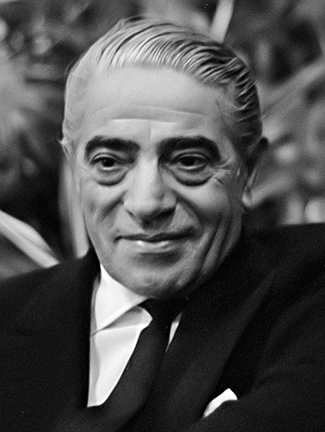



Comments
Sorry, comments are closed for this item